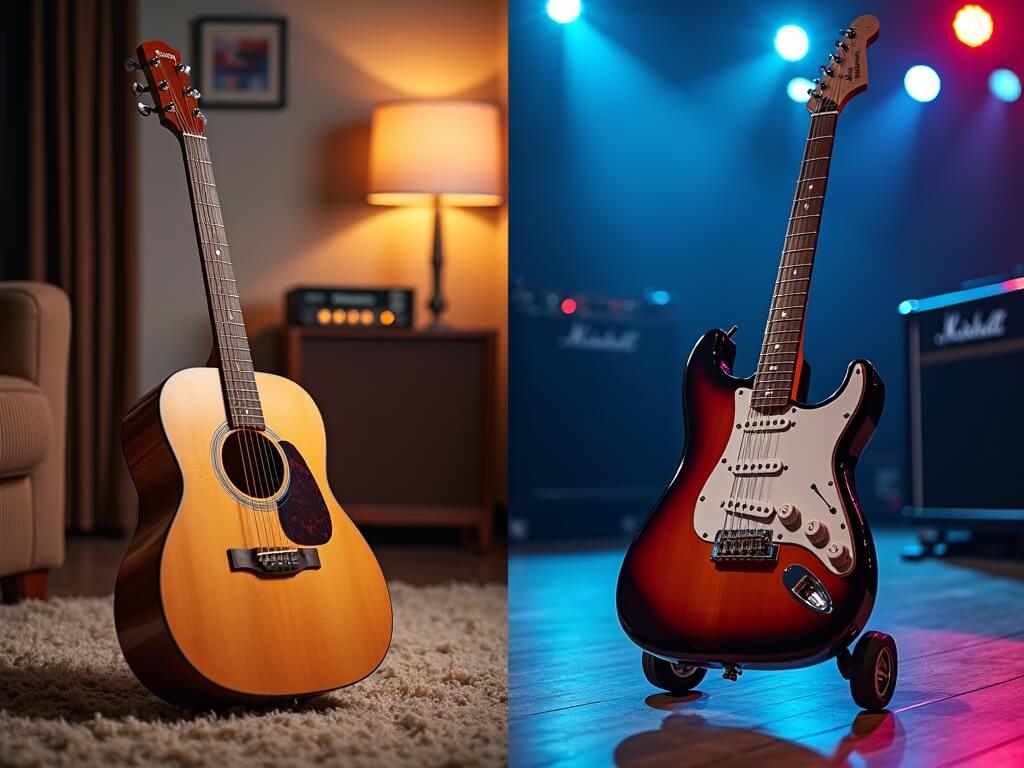Feb 10, 2025 02:56:46 PM
Acoustic vs Electric Guitar: Which Is Better For Beginners?

Choosing between an acoustic and an electric guitar can be tough for beginners. Each type has its own unique features and benefits.
This decision often shapes a new player's musical journey. Acoustic guitars are known for their rich, warm sound and simplicity. They are easy to carry and perfect for playing anywhere. On the other hand, electric guitars offer a wide range of sounds and effects, making them great for different music styles.
Understanding the main differences between these two guitars can help you find the right fit. This choice affects your learning experience and enjoyment. Let’s explore the key points to consider when deciding which guitar is better for you as a beginner.
Acoustic Vs. Electric: The Great Debate
When it comes to starting your musical journey, the choice between an acoustic and an electric guitar can feel like a monumental decision. It's like choosing between a cozy coffee shop and a buzzing nightclub. Each has its charm, but what’s the right fit for you? In this section, we’ll dive into the characteristics of both types of guitars to help you make an informed choice. So grab your favorite drink and let’s explore!
Characteristics Of Acoustic Guitars
Acoustic guitars are often the first choice for many beginners. Their simplicity and natural sound make them appealing. Here are some key features:
- Sound: Acoustic guitars produce sound through their hollow body. This gives them a rich, warm tone that many find soothing.
- Portability: No need for amps or cables! Just grab your guitar and go. Perfect for outdoor jams or coffee shop performances.
- Price: Generally, acoustic guitars can be more affordable, especially for entry-level models.
- Learning Curve: Acoustic guitars usually have wider necks, which can help with finger placement and strength.
Many people start with acoustic guitars because they’re straightforward. I remember my first guitar was an old acoustic I found in my grandma’s attic. I spent hours strumming away, feeling like a rock star (even if I only knew three chords!).
Characteristics Of Electric Guitars
On the other hand, electric guitars offer a different experience altogether. They’re like the wild side of the musical spectrum. Here’s what makes them unique:
- Sound: Electric guitars rely on pickups to amplify sound. This allows for a wide range of tones and effects, perfect for rock, blues, and jazz.
- Weight: They tend to be lighter than acoustics, making them easier to handle for long periods.
- Versatility: With electric guitars, you can play various genres and styles thanks to the ability to use effects pedals and amplifiers.
- Learning Flexibility: Many beginners find electric guitars easier to play because the strings are lighter and the action can be adjusted for comfort.
When I finally got my hands on an electric guitar, it felt like a whole new world opened up. Suddenly, I could make all these cool sounds and effects. It was like going from black-and-white TV to color!
So, which is better for beginners? It really depends on your goals and what kind of music you want to play. Are you dreaming of strumming by the campfire or rocking out on stage? The choice is yours! Lets discuss more.
First Strum: Ease Of Learning
When you pick up a guitar for the first time, whether it’s an acoustic or an electric, that first strum can feel like magic. But not all guitars are created equal when it comes to ease of learning. For beginners, the choice between an acoustic and electric guitar can seem daunting. Let's break it down in a way that even a new player can understand!
Playability Concerns
Playability is a big deal for beginners. It refers to how easy a guitar is to play. Here’s a quick comparison:
- Acoustic Guitars: Generally, they have thicker strings and a wider neck. This can make pressing the strings a bit tougher for beginners. However, they are great for developing finger strength!
- Electric Guitars: Usually, they have lighter strings and a slimmer neck. This means you can press down on the strings with less effort, making it easier to play chords and melodies.
Many beginners find electric guitars more forgiving. If you’re still wrestling with your first chords, an electric guitar might just be your best buddy!
Fingertip Comfort And Calluses
Now, let's talk about those little things called calluses. If you’ve ever seen a seasoned guitarist's fingers, you know they have tough skin on their fingertips. This is a result of playing regularly. But here's the thing:
- With an acoustic guitar, you might find the thicker strings painful at first. Your fingertips will feel like they’ve run a marathon!
- With an electric guitar, the lighter strings can be much gentler on your fingers. You can strum away without wincing at every note.
So, if you want to avoid the initial pain and focus on having fun, an electric guitar might be the way to go. But remember, pain can lead to gain! Building those calluses can be a badge of honor for many musicians.
Ultimately, the best choice depends on your personal comfort and what you want to play. The journey of learning guitar is all about finding what feels right for you. So, grab a guitar, strum away, and enjoy the process!
Sound Matters: Tonal Differences
When it comes to choosing between an acoustic and electric guitar as a beginner, one of the biggest factors to consider is sound. The tonal differences between the two can greatly influence your playing experience. Let's dive into how these instruments create their unique sounds and what that means for you as a budding musician.
Acoustic Warmth And Resonance
Acoustic guitars are known for their rich and warm tones. The sound comes from the vibration of the strings, which resonates through the body of the guitar. This natural amplification gives acoustic guitars their characteristic sound. Here are some key features of acoustic guitars:
- Natural Sound: No need for electricity. Just strum, and let the music flow!
- Fuller Sound: Acoustic guitars often have a deeper, more resonant sound that fills a room.
- Playing Style: Ideal for fingerpicking and strumming. Great for songs that require a softer touch.
Imagine sitting around a campfire, strumming your acoustic guitar while friends sing along. The warmth of the sound wraps around you like a cozy blanket. Acoustic guitars can evoke emotions and create connections, making them a fantastic choice for beginners who want to share music with others.
Electric Versatility And Effects
On the flip side, electric guitars offer a different world of sound possibilities. They use pickups to convert string vibrations into electrical signals, allowing for a wide range of tonal options. Here’s what makes electric guitars so appealing:
- Wide Range of Sounds: With pedals and amplifiers, you can create everything from a soft jazz sound to a heavy rock tone.
- Lightweight: Generally easier to hold and play, especially for long periods. Your fingers will thank you!
- Creative Freedom: Experiment with different effects like reverb, distortion, and delay. Who doesn't love a little creativity?
Picture this: You're on stage, the lights are dimmed, and as you strum your electric guitar, the sound transforms with each pedal effect you press. The crowd goes wild! Electric guitars can take you on a sonic journey, making them perfect for those who dream of rocking out.
So, which is better for beginners? It really depends on what kind of sound you want to create. Do you prefer the warm, natural tones of an acoustic, or are you drawn to the versatile soundscapes of an electric guitar? Ultimately, the choice is yours. Happy strumming!
Volume And Amplification
When it comes to choosing between an acoustic and an electric guitar, one of the key factors to consider is volume and amplification. Each type of guitar has its own unique sound characteristics that can greatly affect your playing experience. For beginners, understanding these differences can help you make a more informed choice. So, let’s dive into the world of volume and amplification!
Natural Volume Of Acoustics
Acoustic guitars are known for their beautiful, resonant sound that comes from their hollow body. Here are some key points about their natural volume:
- Self-Sufficient: Acoustic guitars do not require any additional equipment to be heard. Just strum away!
- Perfect for Beginners: They are great for practicing at home without the need for amplifiers.
- Volume Control: The volume is controlled by how hard you strum. Softer strumming equals quieter sound, and vice versa.
However, if you’re playing in a large space or with a group, you might find that acoustics can struggle to project their sound. Ever tried to sing at a concert without a microphone? That’s how an acoustic guitar can feel sometimes!
Amplifiers And Pedals For Electrics
On the other hand, electric guitars rely on amplifiers to produce sound. This opens up a whole new world of possibilities!
Here’s what you need to know:
- Amplifiers: They come in various sizes and styles. Some are tiny and portable, while others are big and powerful.
- Sound Variety: You can change the sound significantly with different amp settings. Want a clean tone? Or maybe something crunchy? The choice is yours!
- Pedals: Effects pedals can add interesting sounds, from reverb to distortion, making your playing more dynamic.
But remember, with great power comes great responsibility. An electric guitar setup can be more complex and expensive. If you’re just starting, this might feel a bit overwhelming. Think of it like trying to cook a fancy dish when you’ve just learned how to boil an egg!
In conclusion, the choice between acoustic and electric depends on your personal preference and playing style. Do you want the simplicity and natural sound of an acoustic, or are you drawn to the versatility of an electric with its amplifiers and effects? Whatever you choose, the most important thing is to enjoy the music you create!
Portability And Convenience
Choosing between an acoustic and electric guitar often hinges on portability and convenience. Beginners want a guitar that fits their lifestyle. Weight, size, and the need for extra gear matter. Let's explore how each type performs in these areas.
Traveling Light With Acoustics
Acoustic guitars are simpler. They don’t need extra equipment. Most models are lightweight and easy to carry. You can grab one and go anywhere.
Playing outdoors or at friends' homes? An acoustic guitar is perfect. Just pick it up and strum. No need for power outlets or amplifiers.
Acoustics also come in various sizes. Smaller models fit easily in your car or backpack. They are great for beginners who want to practice on the go.
Gear And Setup For Electric Guitars
Electric guitars require more than just the guitar itself. They need amplifiers and cables. This setup can be bulky and heavy. Carrying this gear can be a hassle.
Playing electric means thinking about locations. You need a power source for the amp. This limits where you can play compared to acoustics.
For beginners, setting up an electric guitar can be tricky. You must connect everything correctly. This can take time and patience.
Electric guitars can be fun to play. But the extra gear makes them less convenient for travel. A simple acoustic guitar offers easy access and less fuss.
Genre And Style Considerations
Choosing between an acoustic and electric guitar as a beginner can feel like a daunting task, especially when you start to think about the music genres you want to play. Each guitar type offers a unique sound and style, which can greatly influence your journey as a musician. So, what genres can you explore with each type? Let’s break it down.
Music Genres Suited For Acoustic
Acoustic guitars have a warm, rich sound that makes them ideal for a variety of music styles. Here are some genres where an acoustic guitar shines:
- Folk: Think of artists like Bob Dylan and Joan Baez. Acoustic guitars are perfect for storytelling and soulful melodies.
- Country: From Johnny Cash to Taylor Swift, the acoustic guitar is a staple in country music.
- Blues: The raw, emotional sound of acoustic blues can really tug at your heartstrings.
- Pop: Many pop songs use acoustic elements to create a soft, catchy vibe.
- Classical: If you fancy fingerpicking and intricate melodies, classical guitar might be your calling!
Imagine sitting around a campfire, strumming your acoustic guitar while friends sing along. Sounds fun, right? Acoustic guitars are perfect for creating that relaxed, communal atmosphere.
Music Genres Suited For Electric
On the other hand, electric guitars open the door to a whole new world of sound. They are versatile and can cater to numerous genres, including:
- Rock: From classic rock legends like Led Zeppelin to modern bands like Foo Fighters, electric guitars are the heart of rock music.
- Metal: If you love heavy riffs and fast solos, an electric guitar is a must-have.
- Jazz: Electric guitars can deliver smooth tones and complex chords that jazz musicians adore.
- Blues: Yes, blues can also be played on electric! Think of artists like B.B. King, who brought electric blues to life.
- Pop: Many pop hits feature electric guitars for that punchy, upbeat sound.
Picture yourself on stage, electric guitar in hand, with the crowd cheering. The thrill of playing an electric guitar can be exhilarating, especially if you dream of rock stardom!
In conclusion, your choice between acoustic and electric guitar may depend on the genres you love. If you enjoy soft, heartfelt songs, go for acoustic. If you want to rock out, electric is the way to go. What genre speaks to you? The answer might just guide you to your perfect first guitar!
Cost Implications For Beginners
When you're a beginner, the cost of starting a new hobby can feel like a mountain to climb. This is especially true for learning to play the guitar. Acoustic and electric guitars come with different price tags and hidden costs, making it important to understand what you're getting into. Let's break down the costs associated with each type, so you can make the best choice for your wallet and your musical journey!
Initial Investment In An Acoustic
Acoustic guitars are often seen as a straightforward option for beginners. They are generally more affordable upfront, but it’s wise to look beyond just the price tag.
- Basic Acoustic Guitars: You can find decent beginner acoustic guitars ranging from $100 to $300.
- Quality Brands: Brands like Yamaha and Fender offer reliable options that are often recommended.
- Extras: Don’t forget about essential accessories:
- A tuner (around $20)
- A guitar case (approximately $50)
- Strings (about $10 for a pack)
So, if you’re starting with an acoustic guitar, your initial investment could range from $200 to $400 depending on your choices. It’s like buying a simple meal and realizing you need to add a drink and dessert!
Additional Costs For Electric Setups
Now, let’s talk about electric guitars. While they may look cooler with all those shiny knobs and switches, they also come with additional costs.
- Guitar Price: A decent electric guitar for beginners typically starts around $200 and can go up to $600.
- Amplifier: You’ll need an amp, which can cost anywhere from $50 to over $200.
- Cables and Accessories: Don’t forget to budget for:
- Cables (approximately $15 each)
- A tuner (around $20)
- Strings (also about $10 for a pack)
- Pedals for effects (starting from $30)
Overall, the total cost for starting with an electric guitar can easily reach $400 to $1,000 or more! It’s like going to a buffet—tempting but can get expensive if you’re not careful!
In conclusion, both acoustic and electric guitars have their unique costs. The choice ultimately depends on your budget and what sound you want to create. Will you strum your way through folk songs on an acoustic, or will you rock out with an electric? The decision is in your hands, and remember, it’s all about enjoying the music you create!
Learning Resources And Community
Learning to play guitar can be exciting. Many resources and communities help beginners. These tools make the journey easier and more enjoyable. Finding the right support is key.
Online Tutorials And Lessons
Many websites offer free guitar tutorials. YouTube is a great place to start. Many channels focus on beginners. They teach basic chords and strumming patterns.
Some platforms offer structured lessons. Websites like Guitar Tricks and JamPlay provide clear paths. They cover acoustic and electric guitar. You can learn at your own pace.
Mobile apps also provide lessons. Apps like Yousician and Fender Play make learning fun. They include interactive features and instant feedback.
Supportive Communities For Learners
Joining a community can boost your learning. Online forums and social media groups connect learners. You can ask questions and share experiences.
Reddit has active communities like r/Guitar. Members share tips and resources. You can find encouragement from fellow learners.
Local music shops often host events. These gatherings allow you to meet other guitarists. You can learn from each other and build friendships.
Making The Decision: Which To Choose
Choosing between an acoustic guitar and an electric guitar can be tough. Each type offers unique benefits. Your choice depends on your personal goals and preferences. Let's explore how to make the best decision.
Personal Goals And Aspirations
Your musical goals shape your choice. Do you want to play in a band? Electric guitars shine in group settings. They can produce loud, powerful sounds.
Acoustic guitars are great for solo performances. They provide a warm, rich tone. Consider what styles you enjoy. Folk, rock, or jazz? Each genre may favor one type over the other.
Think about portability too. Acoustic guitars are easier to carry. They don’t need extra gear. Electric guitars need an amplifier. This can limit where you play.
Try Before You Buy: Test Driving Both
Testing both types of guitars is important. Visit a music store. Play a few acoustic and electric guitars. Feel the difference in weight and size.
Listen to how they sound. Acoustic guitars produce sound naturally. Electric guitars need an amp to reach their full potential. Try different styles and techniques.
Ask the staff for help. They can guide you on features. This will help you find a comfortable fit.
Don’t rush the decision. Enjoy the process. Finding the right guitar is a personal journey.
Conclusion
Choosing between an acoustic and electric guitar depends on personal preference. Acoustic guitars are simple and portable. They offer a warm, natural sound. Electric guitars provide versatility and a range of tones. Beginners should consider their musical interests. Do you prefer strumming chords or playing solos?
Both guitars have their benefits. Start with what feels right for you. Remember, practice and passion matter most. Enjoy your musical journey, no matter which guitar you choose.

The 15-Minute Guitar Ritual That Transforms Beginner Guitarists without Endless Practice

Guitar Picking Mechanics: Master Speed and Dexterity Today

The Backwards Guitar Revolution: Why I Turned Traditional Teaching Upside Down